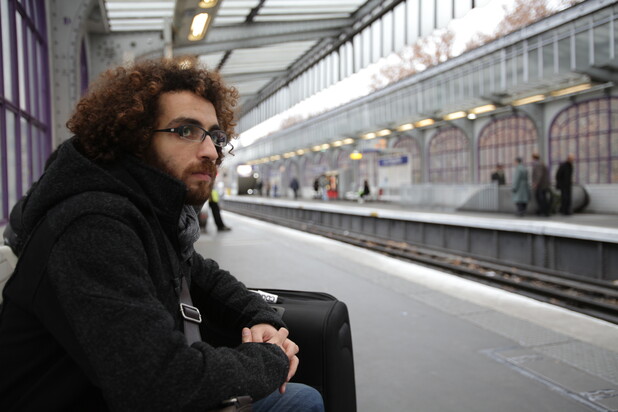Arts and Culture 4 May 2015

Words Without Borders, the widely-respected magazine of world literature in translation, has devoted its May 2015 edition to new writing from Palestine.
As the blurb for the special edition emphasizes, the “eight young authors here work in multiple languages and hail from five continents, testifying to Palestinian literature’s vast thematic, stylistic, and linguistic range.”
Nathalie Handal, the guest editor for the edition, put it another way in her incisive introduction: “Wherever Palestinians are scattered, be it in Israel, the West Bank, Gaza, in refugee camps in the Arab world, or displaced around the globe, they are confined to the particularities of whatever boundaries — national or physical, psychological or emotional — they were dealt after the Nakba.”
The multiplicity of languages, countries of domicile and life experiences of the contributors to be found in this Words Without Borders issue is testament to that enforced diversity.
Prickly poetry
Poet Mazen Maarouf, for instance, was born in Shatila refugee camp in Lebanon but had to leave the country’s rising political tensions and is now based in Iceland. The precarity and disruption of his life was charted in an Al Jazeera documentary in 2013.
Maarouf’s poem “Solitary Confinement on the Seventh Floor” evokes both the claustrophobia and sense of instability of the refugee situation in startling, superficially self-inflicted brutality:
One day
I’ll tear off my lips
and eat them
like candy.
A second poetic contribution to the collection, from the spikily humorous pen of Najwan Darwish (whose selection “Nothing More to Lose,” like this work translated by Kareem James abu-Zeid, was published in 2014), also depicts a sense of alienation.
For Darwish, though, this is not Maarouf’s experience of dispersion and geographical distance, but that of the Palestinian citizen of the State of Israel, intruded upon and disconnected from the multiplicity of causes and beliefs around him.
The third poem in this issue of Words Without Borders comes from Danish-Palestinian enfant terrible Yahya Hassan, whose eponymous debut collection was Denmark’s best-ever-selling first poetry book.
Hassan has gone on to make a name for himself for outspoken political comments in a country which likes to pride itself on its open-mindedness. In this work, he touches on a theme which has landed him in trouble before — the inter-generational tensions of many migrant communities, evoking “A Stone-Age hand a paperback Koran” in a troubled father-son relationship.
Short stories
Alongside these poetic choices comes a series of short stories. In “Your Baby,” Asmaa Al Ghul, a journalist from Gaza, conjures up the bizarre sensations of a caesarean section birth.
Is this artificial intervention in the protagonist’s labor a reflection on the many intrusions Palestinians living under siege experience on their life processes, or better read as one of the rapidly growing number of women from Gaza in particular writing challenging, intimate accounts of female life?
Rodrigo Hasbun, meanwhile, is a multi-award-winning Colombian writer of Palestinian origins. In “Long Distance” he evokes the layerings of separation in lives lived at geographical and emotional distance, shot through with silences and lies.
And Eyad Barghuthy, in “A Knockout Punch,” also plays with these subtle layers of identity. He tells the story of Adib Nisnas, a Black Palestinian boxer from the city of Akka, in the north of present-day Israel.
As Nisnas’ career takes him to national and then international fights, the “Moroccan immigrants” are first Jewish Israelis who taunt him from the ringside for being an Arab, but then in Paris are themselves Arabs who shout in support of him.
The non-fiction context
Creating a kind of framework into which all these stories and poems sit, two nonfiction pieces accompany Handal’s introduction.
Writer Sousan Hammad’s account of her grandmother’s life — married off at 17 after her father was murdered in the family’s Jerusalem bakery — looks back at the history of tragedy and displacement which characterizes so many Palestinian families.
But in following her grandmother’s hand-drawn map of where her house once stood, Hammad finds only heat, dust and confusion in “a city compiled by exiles in exile.”
Nathalie Handal’s interview with Australian-Palestinian novelist Randa Abdel-Fattah, meanwhile, joins with Hammad’s writing in complicating assumptions about identity, memory and nostalgia for young Palestinian writers around the world.
“Sometimes I felt a hybrid of Australian and Palestinian. Sometimes I felt neither Australian nor Palestinian, tired of identity politics,” Abdel-Fattah states.
She and Handal explore the complex ways in which her writing — much of it aimed at young adults — interrogates the experience of diverse communities within Australia, a country populated almost entirely by migrants and, like Israel, built on expropriated land.






Comments
Very interesting. And really
Permalink stephen byrne replied on
Very interesting. And really enjoyed the interview with Nathalie Handal and Randa Abdel-Fattah.